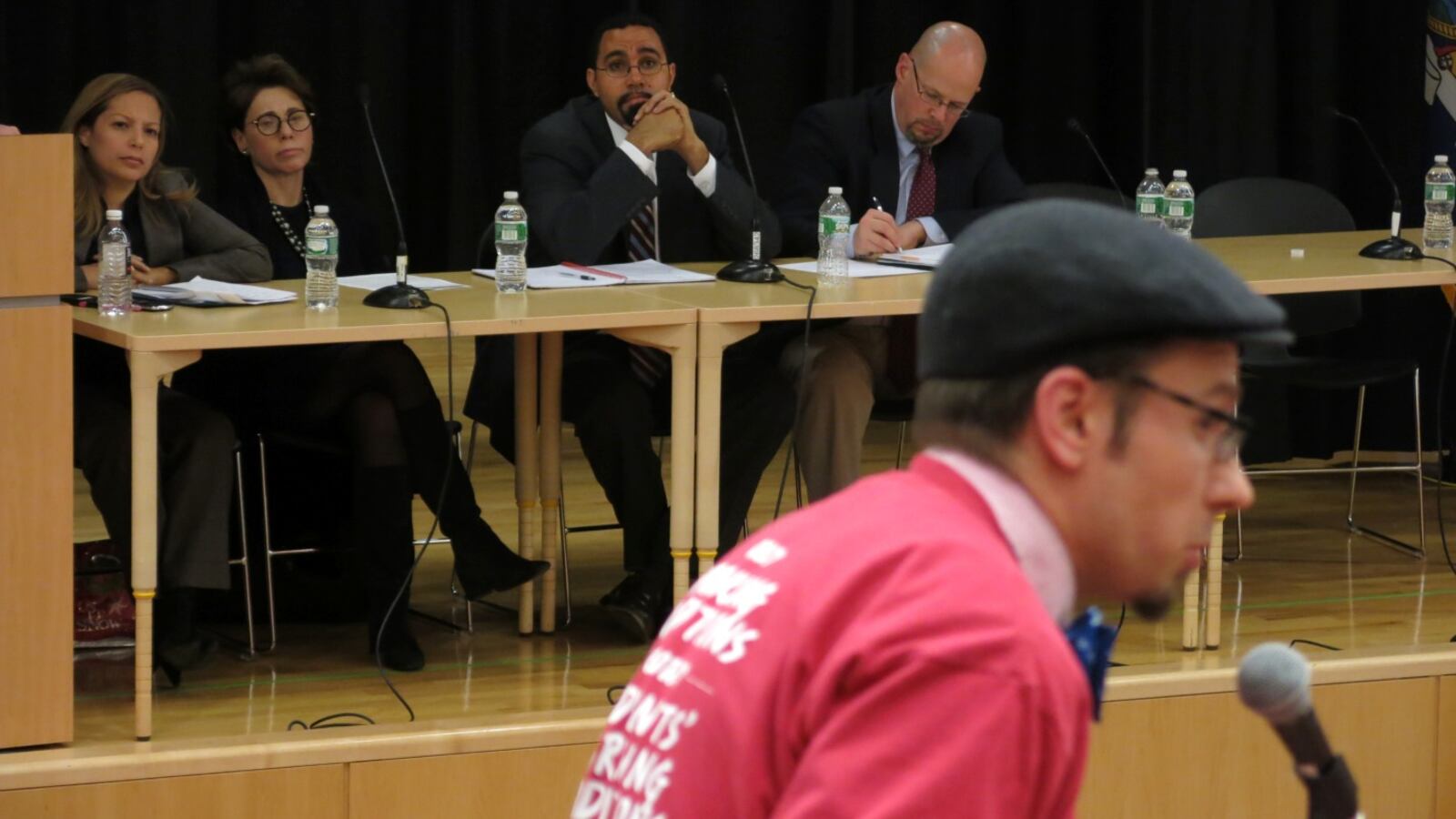It’s been a rough year for the Common Core in New York.
After the painful results of the first Common Core tests were released last summer, anxiety over the new standards went mainstream, and before long parents and lawmakers were demanding that the rollout of the standards be slowed or even halted.
Since then, city and state officials have lowered the stakes tied to the Common Core tests, but the standards remain a potent political issue – especially in this year’s gubernatorial race.
The latest scores will give some sense of how students and teachers are adjusting to the standards now that they’ve seen the tests and most have finally received Common Core textbooks (though the jury is out on the new materials).
Still, the scores won’t settle some big uncertainties about the future of the Common Core in New York – from whether an educator-as-chancellor working jointly with the teachers union will be enough to raise the level of classroom instruction, to questions about the state’s long-term plans for the standards.
Below, a recap of the Common Core’s tumultuous year.
Backlash and damage control
As officials had warned, student proficiency rates tanked last year when the state for the first time tied its annual exams to the more demanding Common Core standards, which it adopted in 2010. Only a third of students statewide passed the new tests, with students of color slipping even further behind their white and Asian peers.
State officials and the standards’ backers spun the results as a corrective to past score inflation that illuminated the steep path actually ahead of students aiming for college. But critics saw the scores as evidence of epically poor planning — too little training for teachers, no new textbooks for schools, and failed communication with families.
The scores galvanized many parents, who turned a series of state-hosted Common Core forums last fall into raucous protests. By that winter, the state teachers union had demanded the ouster of State Education Commissioner John King and withdrawn its support for the standards “as implemented.”
The ever-greater opposition forced lawmakers to get involved. (Unlike in some other states, most elected officials here stood by the standards even as they blasted the way education officials had rolled them out.) Following deals between the state legislature and the governor, Common Core test results will not — for now — appear on student transcripts or determine whether they move to the next grade, nor will they count against teachers in the new evaluation system.
It’s not hard to draw a line from the outcry over the Common Core test scores to those changes, said Joseph Viteritti, a professor of public policy at Hunter College.
“By popularizing the issue,” he said, “it gave legislators an interest to jump into this.”
More tests, new chancellor
As Common Core skepticism surged, another round of Common Core tests arrived.
Statewide, tens of thousands of families boycotted this spring’s state exams. In the city, more than 900 parents opted their children out, according to advocates – a minuscule portion of all test takers, but more than three times as many as the previous year.
At the same time, concerned educators felt impelled to speak out against the tests. Principals and teachers at more than 40 city schools helped organize sidewalk demonstrations one April morning to protest exams that they considered confusing and poor measures of students’ learning.
Critics saw the tests as just the latest instance of the New York’s bungled Common Core rollout. While most other states are waiting to assess students on the standards until new online tests are released next year, New York decided to move ahead with its own exams. And in the city, botched textbook deliveries last fall meant that some schools started another year without Common Core teaching materials.
Midway through the academic year, Carmen Fariña took over the school system.
The longtime educator quickly voiced her support for the standards, but said families and teachers needed more guidance on how to help students reach them. She also insisted that the Common Core is not amenable to test prep, and to make her point – as well as to conform with new state requirements – she said test scores would no longer be the main factor in student promotions.
The new standards “are what will help our students compete in the future,” Fariña said. “But rote memorization and excessive test prep won’t get us there.”
Uncertainties ahead
The standards may have survived a stormy year in New York, but where they head from here is far from certain.
Fariña and the teachers union president, Michael Mulgrew, have promised that added professional-development time built into the new teachers contract will help educators take command of the new standards. But it remains to be seen whether more training for teachers will translate into more learning for students.
Meanwhile, Fariña has vowed not to use test scores to rate schools in a simplistic way. But she has said less about how she will hold educators accountable for making sure students reach the new standards, or what she will do when schools struggle to meet that challenge.
At the state level, lawmakers have temporarily barred districts from factoring in test scores when deciding whether to fire low-rated teachers. It is possible that when that reprieve ends, a fight could re-erupt over tying teacher ratings to test scores, said Michael McShane, a research fellow at the American Enterprise Institute.
Finally, even as its exams have come under fire, New York has decided not to switch over to the new online Common Core tests when other states first administer them next year. If New York sticks with its own exams, critics say, then it will have squandered one of the main benefits of nationwide standards – the ability to see how each state’s students stack up against the others’.
“It gets rid of the ‘common’ part of the Common Core,” McShane said.

